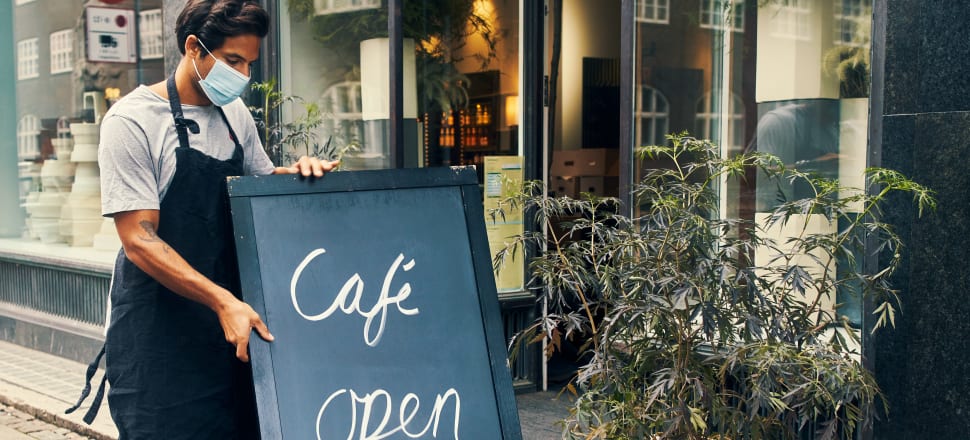
Consumers are back to tossing up whether they should buy cheap or local
The Covid-19 lockdowns of 2020 were a time of strolls down quiet neighborhood streets, 1pm government briefings, and a big push to support local businesses.
It’s an image clear in New Zealand Story Group chief executive David Downs’ mind.
“I remember when the lockdown happened and everyone was saying how amazing it was to have no traffic, the wildlife is back, and how we should never go back to how things were before,” he says.
But it wasn’t all idyllic. Small businesses, particularly those relying on in-person customers such as hospitality, were in struggle street under the restrictions.
It was during these tense times that Downs co-founded SOS Business, a website that allowed people to buy a voucher for a coffee or meal from their favourite cafe and redeem it when the storefront could reopen.
The initiative was successful, with everyone from big corporates to individual customers chipping in. It's no longer needed, now that eateries can welcome customers back into the doors. But since the lockdowns have lifted, he’s noticed the slip away of the more general concerted public effort to support local businesses.
That’s not a surprise to him.
“When you’re in the middle of a crisis, you think differently. We revert back to old habits pretty quickly.”
Inflation trumps good intentions
What habits exactly might that be? Economics understandably are a driving factor for consumer behaviour.
Michael Lee, an associate professor of marketing at the University of Auckland, says all things equal, people in developed countries prefer to buy local.
The problem is the playing field isn’t equal, particularly in terms of cost.
“That’s the tricky part. People would love to support local, but as inflation increases and the cost of living goes up, it makes it very difficult sometimes for people who are already struggling to take ethics and morality into account when they’re just trying to get food on the table,” Lee says.

In 2020, Kantar research found Kiwis were eager to support New Zealand businesses, but price would be a barrier.
Fast forward to 2022, people still want to support local, but the cost is inevitably a factor.
The latest Kantar survey of 1000 people from February found about half of respondents occasionally bought locally produced goods during the past two years, while a third purchased often.
This poll also found 60 percent prioritised New Zealand-made brands, while half actively sought products made by New Zealand-owned businesses.
But the cost factor still remained key, where 56 percent of consumers sought cheap products.
Competition sows seed of innovation
Emma Weenink, chief executive officer at food and supplement supplier Hemp Connect, is all too aware of this.
According to Weenink, imports of cheap hemp from China and Canada have caused stiff competition in the New Zealand market.
“The landed cost was half of what it costs us to produce it ourselves. As much as Kiwis like to support local, that’s probably not enough to do it for double the price,” she says.
“That is so reasonable - you’d have to be pretty altruistic to buy New Zealand-made if it's double the price.”
This cost difference has prompted the business to be innovative and creative, Weenick says.

“We’ve worked out all of the main products that people like, whether it's oil, protein powder, or hemp hearts, and then found pathways for all of the other byproducts that it creates when you're making it,” she says.
“That’s where the innovation has been for New Zealand. I'm not sure if we would have got there as fast if the imported price drop had not forced us to do that.”
Shipping delays and increased freight costs, however, have seen the cost of imported hemp reach price parity with locally-produced hemp, according to Weenick.
“The actual challenge for us as New Zealanders is to work out well how can we produce ethically sustainable goods and services at a price that everyone in New Zealand can afford." – Emma Weenick, chief executive at Hemp Connect
If this continues, it's a matter of seeing whether consumer preferences will change, but Weenick is anticipating manufacturers or wholesale customers might be hesitant to swap suppliers.
“That’ll be the challenge, but I’m sure we’ll get there because we’ve ticked all the boxes of price and quality.”
For long-term financial growth, Weenick ultimately has her eye on the export market. The company has a deal under wraps that's due to start in February.
“The actual challenge for us as New Zealanders is to work out well how can we produce ethically sustainable goods and services at a price that everyone in New Zealand can afford.”
Support local, through thick and thin
The Buy NZ Made campaign has been promoting and encouraging Kiwis to buy local products since 1988.
“Small businesses are still battling with the pressures of inflation, soaring shipping costs, and a looming recession so it’s more important to support local than the previous three years of the pandemic," – Dane Ambler, Buy NZ Made
Executive director Dane Ambler says about 1350 businesses are licence holders using the New Zealand Made Kiwi trademark, which identifies their product as originating here.
Ambler says local business has enjoyed good support from the public during the lockdowns, and he wants to see this continue, particularly through government encouragement for Kiwis to buy local.

“Now the rubber hits the road, times are getting tough for businesses,” he says.
“Small businesses are still battling with the pressures of inflation, soaring shipping costs, and a looming recession so it’s more important to support local than the previous three years of the pandemic."







